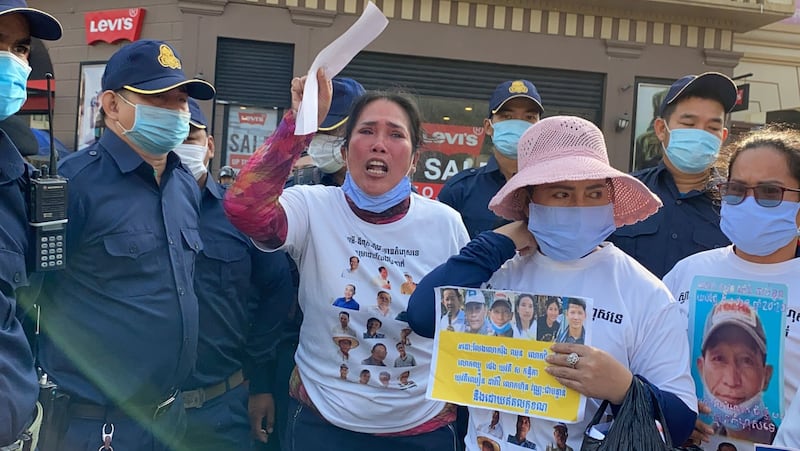The trial of opposition Cambodia National Rescue Party (CNRP) President Kem Sokha is unlikely to resume in 2021 due to ongoing concerns over the coronavirus pandemic, according to court officials, despite calls to expedite the proceedings after nearly a year of delay.
Cambodia’s Supreme Court dissolved the CNRP in November 2017, two months after Kem Sokha’s arrest for allegedly plotting to overthrow the government. His trial at the Phnom Penh Municipal Court began on Jan. 15, 2020 but was suspended in March last year on the pretext of the pandemic and Prime Minister Hun Sen has hinted that it may not conclude until 2024, long after the next election cycle.
The ban of the CNRP marked the beginning of a wider crackdown by Hun Sen on the political opposition, NGOs, and the independent media that paved the way for the CPP to win all 125 seats in parliament in the country’s July 2018 general election.
Kem Sokha’s defense team wrote to the court two weeks ago asking that his trial be resumed, saying the drawn-out legal battle has severely infringed on his rights. While Kem Sokha is out on bail awaiting his trial, his political activities are restricted, and he has largely involved himself in humanitarian work. But the opposition chief has said that even such activities are viewed with suspicion by the ruling Cambodian People’s Party (CPP).
In a letter dated Tuesday and recently obtained by RFA’s Khmer Service, however, Phnom Penh Municipal Court Presiding Judge Kouy Sao told Kem Sokha’s defense team his trial would not resume because of the threat of the virus and a growing backlog of cases.
“The judge council would like to inform the co-lawyers that after receiving the request to resume the trial, the council believes the trial cannot resume this year because the COVID-19 situation remains bad and uncertain,” Kouy Sao wrote, referring to the disease caused by the coronavirus.
“On the other hand, the Phnom Penh Municipal Court has been busy with the criminal cases of the charged and accused who are being detained in overcrowded prisons. Those cases present a challenge for the Ministry of Justice’s campaign to resolve the court backlog.”
Kouy Sao said that the judge council will look into resuming the trial “within an appropriate timeframe to ensure the rights and benefits of related parties according to the law.”
Concerns dismissed
Kem Sokha’s lawyer Pheng Heng said the defense team will continue to push for the court to resume the trial, even if through alternative means. He said that if court authorities can’t find a place to try Kem Sokha at the courthouse, they can find a different location, noting that past proceedings have been held in hotels and other similar venues.
Pheng Heng called on the Ministry of Justice to intervene in the case. He also dismissed the court’s concerns over the coronavirus, saying China is sending vaccines to the country.
“[The court] shouldn’t be worried about COVID-19. Cambodia is planning to inject 10 million people and … people are using hand sanitizer and face masks,” he said.
Pheng Heng noted that the Ministry of Justice recently announced that it had reduced the number of backlogged cases by 80 percent, which he said means that the court should have space on the docket to proceed with Kem Sokha’s trial.
Kem Sokha maintains his innocence while rights groups and Western governments say the charges against him are politically motivated, have never been supported by evidence, and should be dropped.
Since his lawyers wrote to the court last month, U.S. Ambassador to Cambodia W. Patrick Murphy met with the opposition chief, calling for Cambodia to expedite his trial and restore his political rights ahead of upcoming commune and general elections in 2022 and 2023, respectively.

Mass trial resumes
Meanwhile, the Phnom Penh Municipal Court on Thursday resumed a trial for 21 CNRP members on charges of “conspiracy” and “incitement,” questioning three activists about whether they had been in contact with the party’s leaders living abroad, which they denied.
Acting CNRP chief Sam Rainsy, his wife Tioulong Saumura, CNRP deputy president Eng Chhai Eang, CNRP deputy president Mu Sochua, and other party officials have been accused of “conspiracy,” “incitement to commit a felony or to disturb social security,” and “inciting military personnel to disobedience,” under articles 453, 494, and 495 and 471 of Cambodia’s criminal code.
Mu Sochua and fellow party leaders and activists living in self-imposed exile had planned to go back to Phnom Penh last month to face the charges, which they insist are designed to silence the opposition, but were blocked by airlines because Cambodia’s government had canceled their passports or refused to provide them visas to enter the country.
Wives and family members of the defendants were forcefully prevented from entering the courthouse to monitor the trial by authorities, who detained four people before releasing them hours later.
Prumh Chantha, the wife of one of the defendants, told RFA the police had acted unjustly.
“We will go forward and we will not be defeated,” she said.
“I am very proud of my husband who is a politician. As a wife I must follow his conscience. I won’t back down and will continue to demand his release so the world will know of our injustice.”
RFA was unable to contact Phnom Penh municipal spokesperson San Sok Seiha on Thursday for comment, but he has previously defended police action against the defendant’s family members, saying they lack permission to gather.
The trial is expected to resume later this month.
Reported by RFA’s Khmer Service. Translated by Samean Yun. Written in English by Joshua Lipes.
